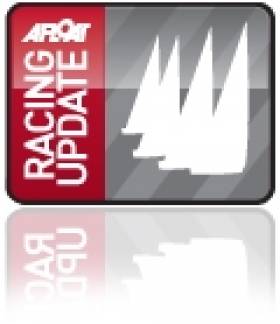Displaying items by tag: Ward
Irish Yacht Wins Three Peaks Yacht Race
The victory was all the remarkable given the Ker 35 was last across the line after a disastrous start. The race began at Barmouth on the mid-Wales coast last Saturday and sea conditions were treacherous with 20 foot waves making it difficult for the race fleet to even leave the harbour.
Danu Techologies, entering the race for the first time, was still being prepared minutes before the start, had to be cut from its moorings and then suffered damage as it motored through the worst of the seas to the start line. Crashing down from a big wave one of the runners aboard was swept across the deck and broke a stanchion, which then punctured the jib, and the navigation computer on which the race route had been planned was destroyed. As the start flare fired the boat was out of position with its mainsail trailing, yet the crew of 3 and their two mountain runners finished the race as winners. They made the 6th fastest passage to Caernarfon, where elite Irish mountain runners, Deon McNeilly and Gary Bailey, made the 24 mile crossing of Mount Snowdon, the highest point in Wales, in the hours of darkness in 5 hours and 10 minutes. After a safe passage of the Menai Strait, and with light winds prevailing, the racing pedigree of a boat designed originally for the IRM Grand Prix rule enabled the team to take the lead. The runners then stayed ahead on the longest land stage, reaching Scafell Pike, England's highest summit, after a mountain bike ride to Ennerdale and a run across Black Sail Pass, which took 8 hours and 6 minutes.
The 32 boats taking part faced strong headwinds, then light airs and periods of calm on the route around the Mulls of Galloway and Kintyre and up through the Inner Hebridean islands to reach Fort William, and the final summit, Ben Nevis. A unique feature of the race is that yachts are rowed through periods of calm and the crew of Andrew Miles and John Prudhoe, took their turn at the oars when required to stay ahead of the challenge from Team Whistler, an Australian team who have formerly won the Tasmanian 3 Peaks Yacht Race and were looking for a unique double win in a Reflex 38. Unable to make up the deficit when they arrived second at Fort William the Australian team switched tactics to win the Tilman Trophy, which requires 4 of the team to reach a mountain summit. Skipper David Rees and crewman Tim Jones put on their walking boats to climb Ben Nevis and claim the prestigious trophy, though they did lose second place overall to Team White Cloud, a HOD 35, skippered by John Donnelly.
The other major trophy of the race, for the Kings of the Mountains, went to endurance runners Martin Beale and Ian Ridgeway, who were racing on team Peaks Addix. They were fastest on all 3 peaks and had a total running time of 13 hours 30 minutes, 2 hours ahead of their nearest challengers.
From the 32 starters there have been 5 retirements and 4 boats are presently still making their way to the finish. At the back of the field is another international team, The Flemish Lowlanders, whose runners were involved in a dramatic rescue of two climbers on Scafell Pike on Tuesday. The Belgian team have until the course closes at 18.00 on Saturday to reach the finish line and complete the race.
Irish Skipper Glen Ward Leads Three Peaks Yacht Race
An Irish debutant in the Three Peaks Yacht Race is leading the fleet after four days of competition off the coast of Scotland.
The Barmouth to Fort William Three Peaks Yacht Race combines yachting and mountain running and cycling into one of the greatest adventure challenges in British sport.
Danu Technologies skippered by Glen Ward is staying ahead of White Clouds and then Team Whistler this afternoon after passing the the Sound of Jura, notorious for becalming boats and forcing them to row, and there are several tidal gates ahead for them to negotiate as they make their way through the Inner Hebrides up to Fort William.
Five team members are allowed, comprising a combination of sailors and runners, their aim is to sail from Barmouth, on the Welsh coast, to Fort William in Scotland, via Caernarfon and Whitehaven, climbing the highest peaks in Wales, England and Scotland on the way.
The race is open to mono-hull yachts only and engine power can only be used close to port, but yachts can be rowed, even pulled along by crew members on the shore but cannot have outside assistance. Its a straight race and the first team to get their runners back to the finish line in Fort William, having completed all the mountains, wins the coveted Daily Telegraph Cup.
It is hard to predict but a finish tonight is likely, and with the runners from the leading two evenly matched, there could yet be a repeat of last year when the runners decided the race on the final Ben Nevis run.
Team Danú Technologies from Dublin, is completely new to this event and although they say their main goal is to finish the race, they also say hey will definitely take every opportunity to snatch victory along the way too!
Danú Technologies is skippered by Glen Ward who has more recently been sailing the boat in single-handed offshore races.
Deon McNeilly, Newcastle AC and Gary Bailey, Mourne Runners are the legs of the team. Deon is looking for new challenge having won most mountain running events in Ireland over the years, including the 2010 Mourne 2 day Elite, while Gary has an excellent record in ultra events winning the 2010 26Extreme Ireland Coast to Coast involving 200miles of running, cycling and kayaking
Essentially, it is 'taking part that counts' and exactly what the less active sailing crew will be suggesting to our runners. Andrew Miles from Manchester is the youngest member of the crew whom has been chasing a chance to participate in this race for the last 5 years! A recent graduate who campaigns an 18ft Skiff. John Prudhoe is the fifth Team member and will be responsible for navigation and weather routing.
Danú Technologies is a Ker35 Built in 2001 and was originally designed for the grand prix IRM rule.

























































